UBOX Micro — M.2 NVMe to 2.5" U.2 SSD (7 mm) Adapter
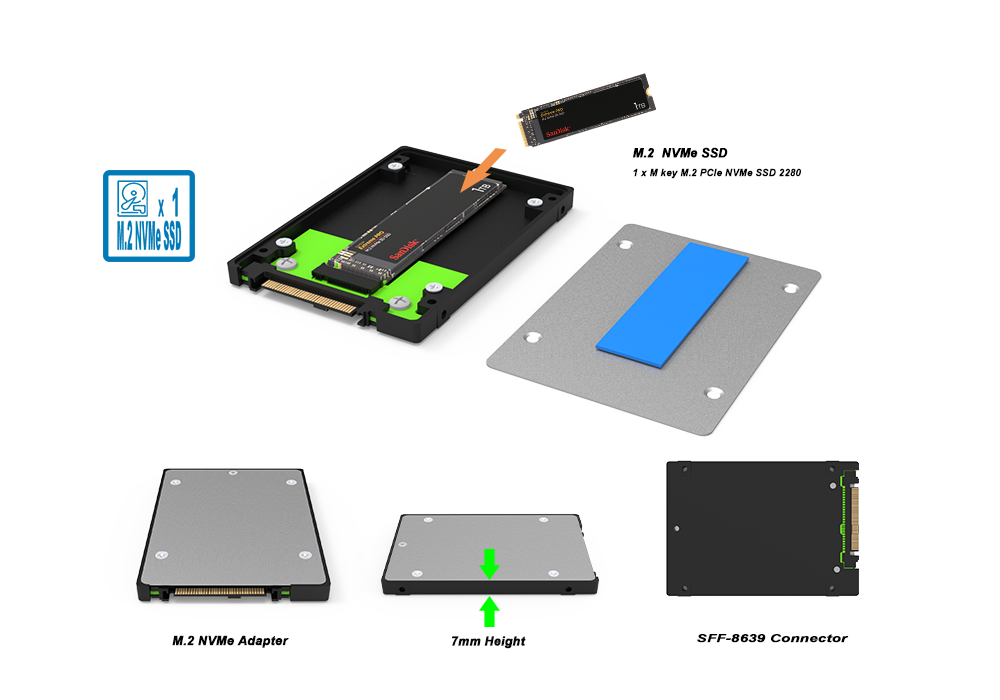
UBOX Micro — M.2 NVMe to 2.5" U.2 SSD (7 mm) Adapter

UBOX Micro is a high-performance, ultra-slim adapter that converts a standard M.2 2280 NVMe SSD (22 × 80 mm) into a 7 mm-thick, 2.5-inch U.2 SSD. It’s a flexible, durable upgrade path for servers, workstations, and embedded/industrial systems that rely on U.2 bays and backplanes. By aligning to the U.2 (formerly SFF-8639) standard and supporting up to four PCIe lanes via NVMe, UBOX Micro lets you deploy fast M.2 storage in hot-swap U.2 infrastructures with minimal friction.
Key Features
• Ultra-thin 7 mm Design
Converts an M.2 2280 NVMe SSD into a standard 2.5" U.2 SSD (7 mm z-height) for tight-space installations and dense drive bays.
• Purpose-Built for 2280 NVMe
Secure fit and stable mounting for M.2 2280 (22 × 80 mm) NVMe drives.
• Service-friendly upgrades
Reuse U.2 infrastructure to change M.2 NVMe SSDs fast—no new trays or backplanes required.
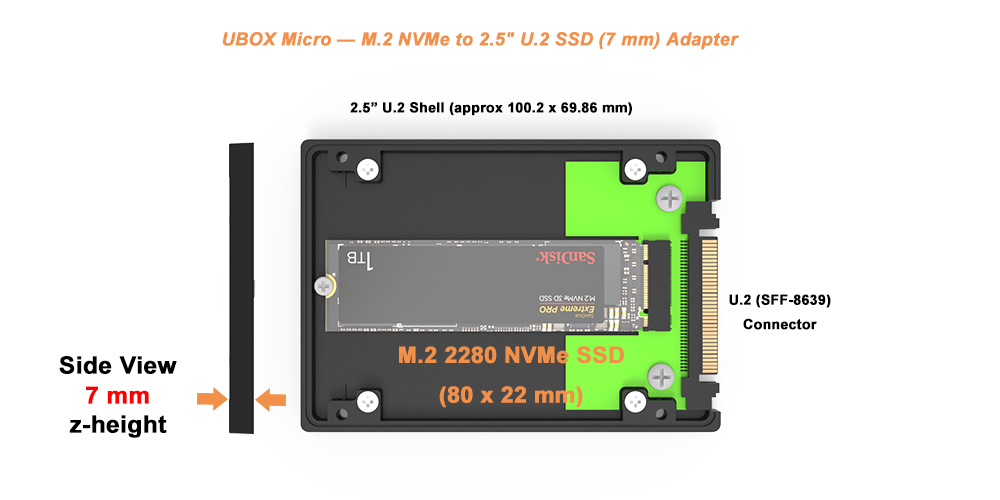
• Standards-Based U.2 Interface (SFF-8639)
Matches U.2 size, port placement, and electrical characteristics for straightforward integration with U.2 hosts, backplanes, and mobile racks.
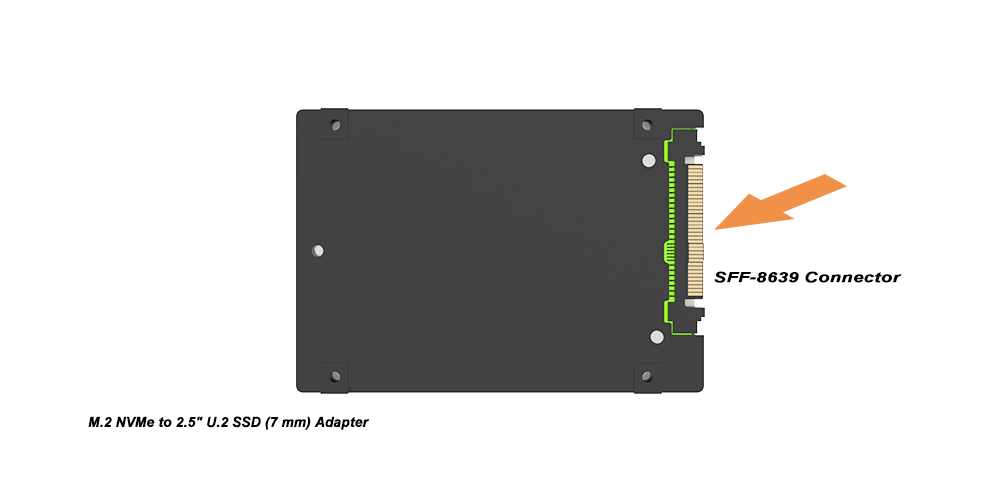
• High-Speed Data Path (up to 40 Gbps*)
NVMe over PCIe ensures low latency and high throughput; U.2 supports up to x4 PCIe lanes for enterprise-class performance. Actual bandwidth depends on host/backplane PCIe generation and configuration.
• Metal Enclosure for Protection & Passive Cooling
Rigid shell guards the SSD and helps dissipate heat in harsh or vibration-prone environments. Integrated thermal pads enhance heat transfer to the enclosure to reduce throttling under sustained loads.
• Integrated Thermal Management
Pre-applied thermal interface pads improve contact with the SSD controller and NAND, helping maintain peak performance during intensive workloads.
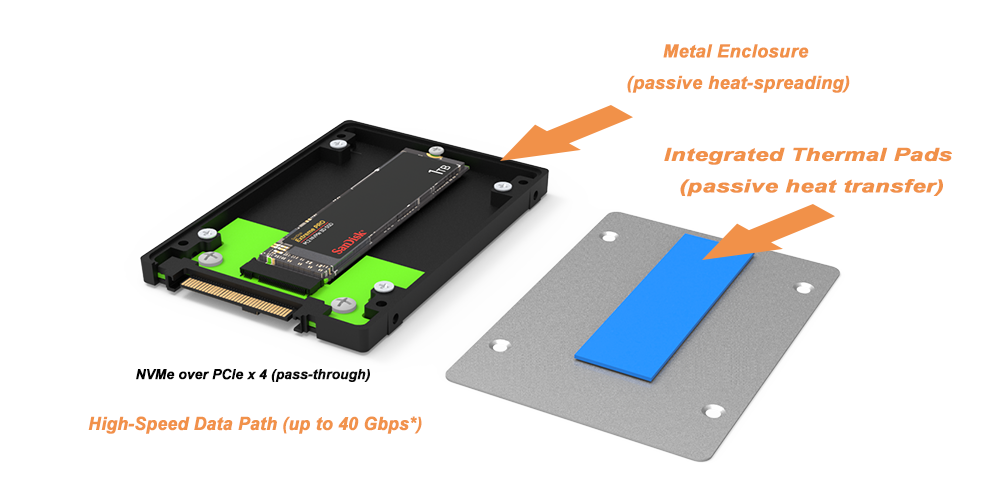
Benefits
• Drop-In U.2 Compatibility
Use common U.2 backplanes, hot-swap bays, and service workflows—ideal for rapid maintenance and scalable deployments.
• Sustained Performance Under Load
Thermal pads and a metal heat-spreading chassis help limit temperature-induced throttling for more consistent throughput over long transfers.
• Rugged, Serviceable Form Factor
Protects the bare M.2 module in a 2.5" carrier that’s easier to handle, label, inventory, and replace in data-center or field environments. (General industry practice for U.2 serviceability.)
• Maximize Existing Infrastructure
Repurpose U.2 bays to run widely available M.2 NVMe SSDs—reducing costs and expanding model choices for capacity and performance.
| Attribute | UBOX Micro (M.2→U.2) | Native U.2 SSD | Bare M.2 on riser/cable |
|---|---|---|---|
| Interface / lanes | U.2 (SFF-8639), PCIe x4 NVMe | U.2 (SFF-8639), PCIe x4 NVMe | Varies (M.2 socket or cabled PCIe) |
| Typical bandwidth ceiling | Host-dependent; up to Gen4 x4 ~64 Gbps theoretical | Host-dependent; up to Gen4 x4 ~64 Gbps theoretical | Host-dependent; may match Gen4 x4 but serviceability varies |
| Serviceability | 2.5" hot-swap workflows, drive trays | 2.5" hot-swap workflows, drive trays | Usually non-hot-swap; board access required |
| Thermal design | Metal enclosure + thermal pads (passive) | Vendor-specific thermal casing | Heatsink-only or bare |
| Mechanical | 7 mm 2.5" bay compatible | 7 mm/15 mm variants exist | Board-level; no 2.5" bay fit |
| When to choose | Reuse U.2 cages; mix-and-match M.2 inventory | Pure U.2 fleets and vendor-locked specs | Lab builds or space-permissive rigs |
Citations for key limits and mechanics: U.2 name/SFF-8639, lanes, hot-swap intent, 7 mm presence, and Gen4 x4 bandwidth.
Possible Applications
• Enterprise & Cloud Servers: NVMe boot drives, caching tiers, and hot-swap data pools using existing U.2 backplanes.
• Professional Workstations: 8K/RAW video editing, VFX, CAD/CAE scratch disks with serviceable U.2 sleds.
• AI/ML & HPC Nodes: Fast local datasets, feature stores, and checkpointing where sustained NVMe throughput matters.
• Edge/Industrial PCs: Ruggedized storage in compact 2.5" U.2 slots for factory, transportation, or telco deployments.
• Lab & Homelab: Clean cable-managed U.2 drive cages while standardizing on cost-effective M.2 NVMe media.
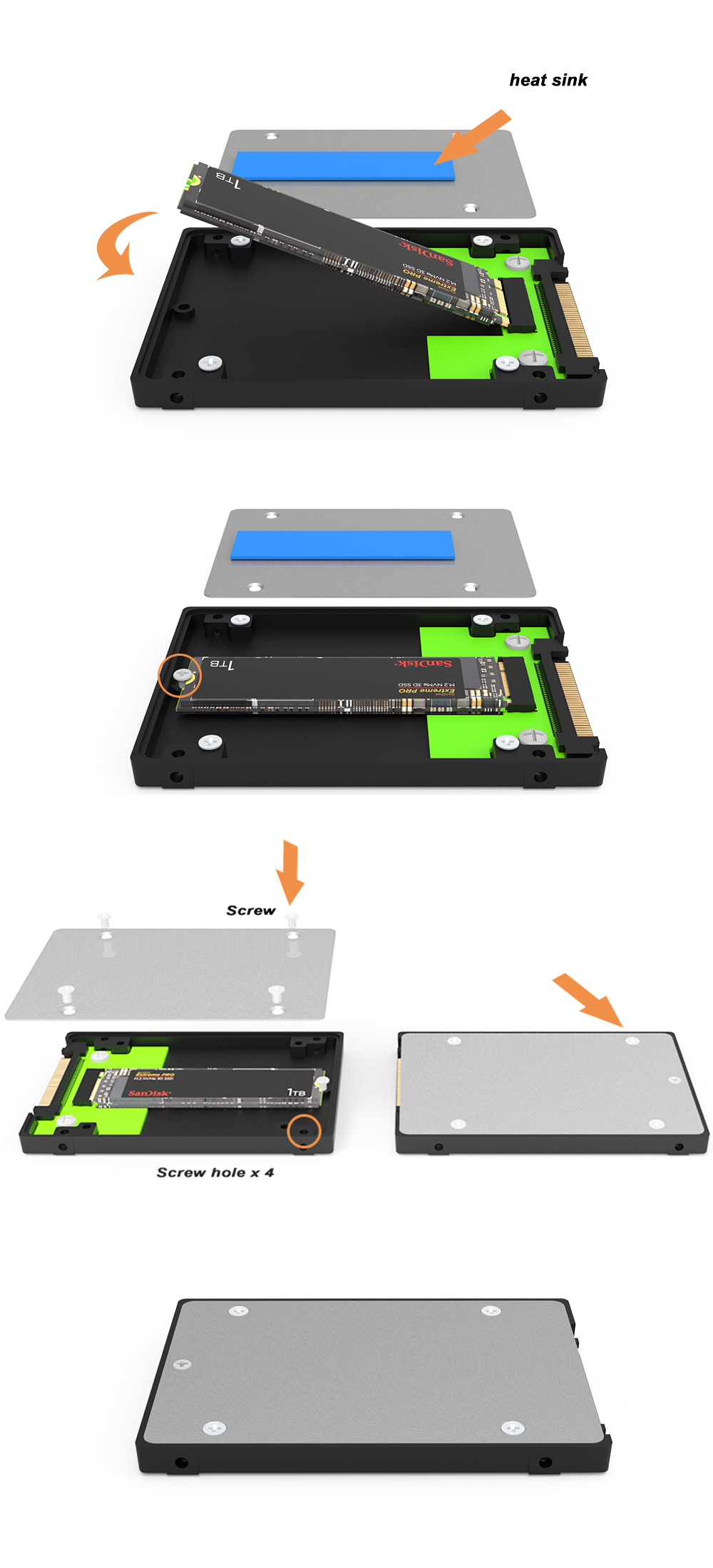
| Specification | Details |
|---|---|
| Model No. | UBOX Micro (M.2 NVMe Converter) |
| Converted Drive Support | M-key M.2 2280 NVMe SSD (NVMe protocol). Not for M.2 SATA. |
| Host Interface | U.2 (SFF-8639); up to PCIe x4 NVMe pass-through. Hot-swap support is defined by the chassis/backplane. |
| Form Factor / Z-Height | 2.5-inch U.2, 7 mm |
| Interfaces (Ports) | 1 × SFF-8639 (U.2) |
| Storage Mode | JBOD – Independent Mode (no RAID) |
| Dimensions | 70 (W) × 109 (L) × 7 (H) mm |
| Operating System | Windows®, Linux® |
| Electrical & Operating Requirements | Line voltage: 12V + 5V DC (typical for U.2) • Operating temp: 32–104 °F (0–40 °C) • Storage temp: −4–116 °F (−20–47 °C) • Humidity: 5–95% non-condensing |
FAQ
Q1: What speed should I expect?
A: UBOX Micro preserves the NVMe x4 path. Actual performance depends on your SSD and host/backplane PCIe gen. As a reference, PCIe Gen4 x4 is up to ~64 Gbps theoretical; Gen3 x4 is ~32 Gbps.
Q2: Is it hot-swappable?
A: If your chassis/backplane supports U.2 hot-swap, the converted drive can participate in the same workflows, since U.2 was specified for enterprise hot-swap in 2.5" bays.
Q3: Which M.2 sizes are supported?
A: 2280 only (22 mm × 80 mm). This ensures a secure fit and optimal thermal contact.
Q4: Does it work with M.2 SATA drives?
A: No. This adapter is for NVMe M.2 (PCIe) drives. M.2 SATA uses AHCI and different electrical signaling.
Q5: Why choose an adapter over native U.2 SSDs?
A: To reuse U.2 infrastructure while tapping the broader M.2 market for capacity/price flexibility—without changing trays or backplanes.
Footnotes
1. U.2 is the industry name for the SFF-8639 connector/family, supporting up to four PCIe lanes and designed for enterprise hot-swap.
2. 7 mm U.2 form-factor drives are common in modern enterprise lines.
3. PCIe Gen4 x4 ≈ 64 Gbps theoretical bandwidth (aggregate) referenced for context. Real-world results vary by platform, firmware, and workload.
Performance test result for reference. The test result will vary depend on the test environment.
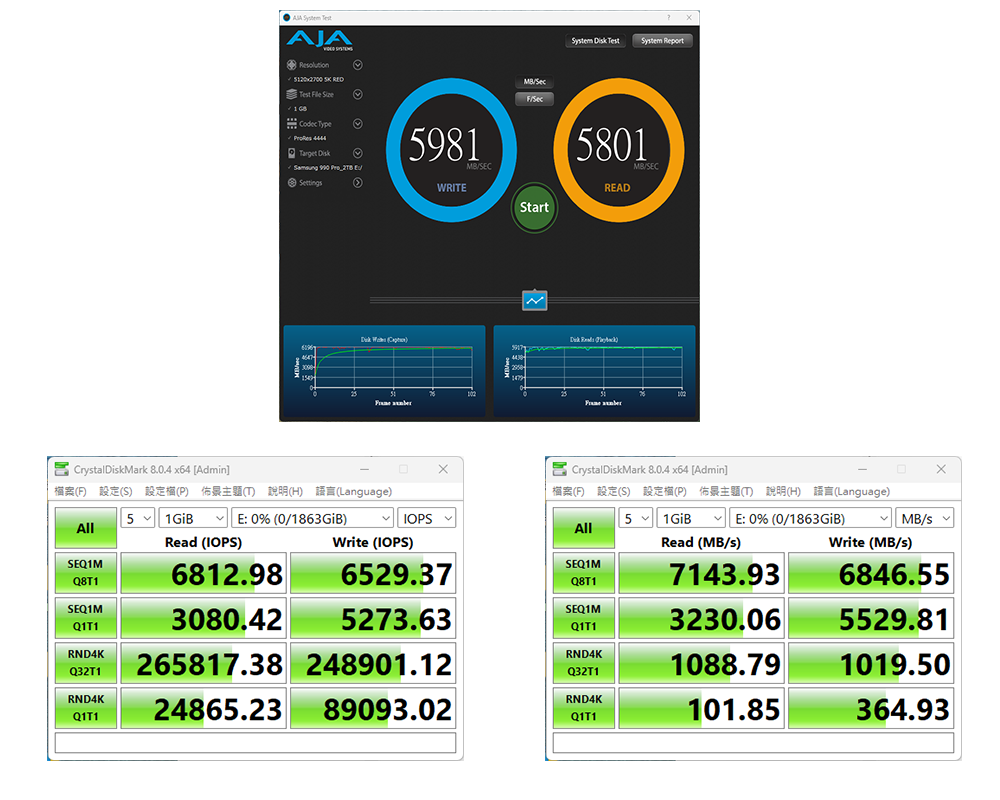
RaidonTek.com (stardom.com.tw) uses cookies to improve site functionality and your overall experience by storing necessary information for service delivery. By continuing, you consent to our use of cookies as detailed in our Privacy Policy, which provides more information about this usage. (Accept cookies to continue browsing the website)